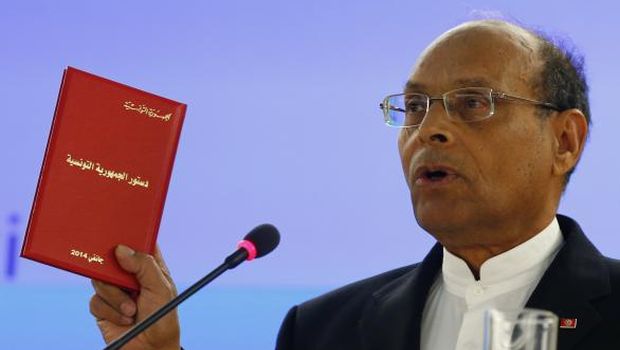
Tunisia President Moncef Marzouki holds a copy of the Tunisian new constitution during his address to the 25th session of the Human Rights Council at the United Nations in Geneva, Switzerland, on March 3, 2014. (Reuters/Denis Balibouse)
Tunis, Asharq Al-Awsat—Tunisian President Moncef Marzouki vowed to defend human rights in Tunisia during a speech in Geneva on Monday, and said that his government would be the first democracy in the Arab world.
Speaking at a meeting of the UN’s Human Rights Council—which is scheduled to run for the rest of the month—Marzouki brandished a copy of Tunisia’s new constitution, and said: “The new Tunisian constitution holds human rights in the highest regard and reflects the nascent democracy that will be the first in the Arab world.”
During the same speech, Marzouki asked delegates gathered in Geneva to support Tunisia through its transitional period, and to help the country retrieve assets embezzled under regime of former President Zine El-Abidine Ben Ali, who was overthrown at the beginning of 2011, as well as more recent financial crimes.
He said: “The recent unfreezing of four bank accounts in Switzerland belonging to corrupt individuals close to the Ben Ali regime is sad news for the people of Tunisia.”
On the situation of human rights in Tunisia, Marzouki said that the security forces had undergone reforms, and that “we are proud of their discipline and professionalism and we value the enormous sacrifices and efforts they have made in fighting crime and terrorism,” though he also admitted that a small minority of officials were reluctant to abandon the tactics they employed under Ben Ali.
Emad Al-Dayami, president of the Congress for the Republic party, which Marzouki founded in 2002, said in a statement to Asharq Al-Awsat that the president’s address at the Geneva conference reflected “his knowledge as head of the Human Rights League in Tunisia.”
He added that Marzouki’s speech was “realistic” in its acknowledgement of flaws and the need for additional steps to prevent the return of systems of abuse, oppression and persecution.
Russian foreign minister Sergei Lavrov arrived in Tunisia on Sunday for an official visit. Lavrov is scheduled to meet Marzouki, and interim Prime Minister Mehdi Jomaa, as well as Foreign Minister Mongi Hamdi later in the week, in order to discuss “cooperation between Tunisia and Russia in a number of areas,” according to a communiqué issued by the Tunisian foreign ministry.
A Tunisian diplomatic source, speaking on condition of anonymity, told Asharq Al-Awsat: “[Lavrov] will convey a clear message to Tunisian officials and ask them to be determined and steadfast in monitoring their land and maritime borders, and not to become an open door for terrorist organizations.”
The source added that the Russians may be aware of Tunisian fighters who have travelled to a number of the world’s hotspots, and feared that more Tunisians may become involved in international terrorism.
